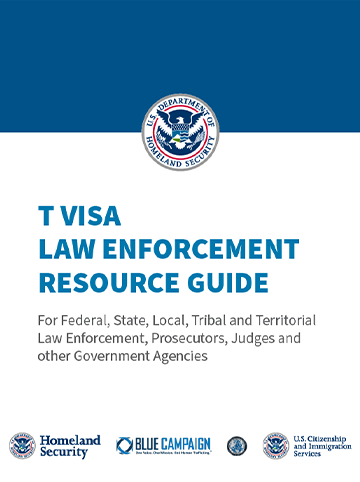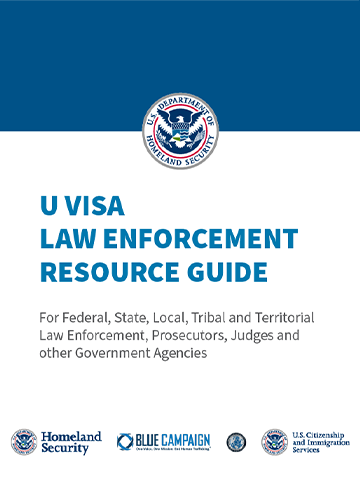Information for Certifying Officials: Law Enforcement, Judges and Other Agencies
Victims of human trafficking and other serious crimes, including domestic violence, sexual assault, and stalking, may qualify for immigration relief, often with help from law enforcement and other certifying agencies at the federal, state, local, or tribal level, as well as judges. USCIS has developed the following resources for federal, state, local, tribal and territorial law enforcement, judges, family protective services and other certifying agencies (including but not limited to the Equal Employment Opportunity Commission and Federal and state Departments of Labor) who may be certifiers for individuals applying to USCIS for U or T nonimmigrant status, also known as the U and T visas.


- T Visa Law Enforcement Resource Guide (PDF, 654.59 KB)
- U Visa Law Enforcement Resource Guide (PDF, 948.64 KB)
Noncitizen victims of human trafficking and qualifying criminal activity may not have immigration status in the United States and may therefore be fearful of working with law enforcement. Traffickers and abusers often use a lack of immigration status to exploit and control victims. In addition, language and cultural barriers may make it difficult for victims to reach out for help after experiencing victimization. Immigration relief provides a path for victims to stabilize their status in the United States and build a sense of safety and security. Immigration relief is also a critical tool to encourage victims to become strong and active participants in the detection, investigation, or prosecution of a crime, and therefore increase community safety as a whole.
Types of Immigration Benefits for Victims of Trafficking and Qualifying Criminal Activity
There are three types of immigration benefits that encourage victims to come forward and work with law enforcement and other certifying agencies. USCIS administers two of these benefits:
- T nonimmigrant status, also known as the T visa, is for human trafficking victims. Victims can remain and work in the U.S. for up to four years. T visas may be extended in limited circumstances; victims can also apply for a Green Card, also known as lawful permanent residency, if they meet certain requirements.
- U nonimmigrant status, also known as the U visa, is for victims of certain qualifying criminal activities, including domestic violence, sexual assault, hate crimes, human trafficking, involuntary servitude, and certain other serious offenses. Victims can remain and work in the U.S. for up to four years once granted this status. U visas may be extended in limited circumstances; victims can also apply for a Green Card, also known as lawful permanent residency, if they meet certain requirements.
- Both T and U visas generally require the victim to assist or cooperate with you in the detection, investigation, or prosecution of human trafficking or qualifying criminal activity. For T visas, there are some exceptions and exemptions to this requirement where the victim was under 18 years of age at the time of victimization or suffers physical or psychological trauma. For U visas, there are some exceptions and special rules for those under 16 years of age and victims who are incompetent or incapacitated.
The DHS Center for Countering Human Trafficking (CCHT) administers the other immigration benefit available to trafficking victims:
- Continued Presence (PDF) (CP) is a temporary immigration designation for trafficking victims identified by law enforcement as potential witnesses so they can remain in the U.S. during an investigation or prosecution. Victims with CP can remain in the U.S. for two years and can apply for employment authorization (CP may be renewed).
Even though the victim (or their advocate or attorney) completes the T visa application or U visa petition, you can play a role in the immigration process.
- For T visas, you can submit the Form I-914 Supplement B: Declaration of Law Enforcement Officer for Victim of Trafficking in Persons (Declaration)
- For U visas, you can submit the Form I-918 Supplement B, U Nonimmigrant Status Certification (Certification)
The victim may ask you, the certifying official or agency, to fill out a declaration or certification, which informs USCIS about the victim’s eligibility for a T or U visa and provides details regarding their assistance in the detection, investigation, or prosecution of the trafficking or qualifying criminal activity.
If the certifying official or agency chooses to complete and sign the declaration or certification, they should provide the original to the victim (or their advocate or attorney) who will submit it to USCIS along with their petition or application and other paperwork and evidence.
Signing a declaration (Form I-914, Supplement B): This declaration may be submitted as part of an application for a T visa. It is not required evidence but is useful for USCIS while evaluating the applicant’s eligibility for a T visa. The agencies that can sign the declaration include any federal, state, local, or tribal law enforcement agencies and prosecutors and judges who have the authority to detect, investigate, or prosecute human trafficking. This includes, but is not limited to, the Department of Justice, the Federal Bureau of Investigation, the Department of Homeland Security, the U.S. Marshals Service, the Department of State’s Diplomatic Security Service, and the Department of Labor.
Signing a certification (Form I-918 Supplement B): This certification is a required piece of initial evidence that must be submitted with a petition for a U visa, and USCIS cannot process the victim’s case without it. Certifying agencies that can sign include federal, state, local, or tribal law enforcement agencies; prosecutors and judges; and other agencies that have jurisdiction to detect, investigate, prosecute, convict, or sentence in their respective areas of expertise, such as child or family protective services, the Equal Employment Opportunity Commission, and the Department of Labor.
Important Things to Remember
- Completing the declaration or certification is consistent with a victim-centered approach to combating trafficking and qualifying criminal activities.
- You, as the certifying official or agency, can provide a certification if the victim has worked with you, is working with you or is likely to provide assistance .
- You can provide a declaration if the victim has complied with any reasonable requests to assist you.
- You can complete a declaration or certification at any time, even if there is no arrest, no charges filed, no formal investigation, no prosecution, no conviction, or if the case is closed. You can provide a declaration or certification for cases that occurred anytime in the past, as long as the victim was working with you.
- There is no federal statute of limitations on when a crime occurred and when a victim may be eligible for these immigration benefits.
- Only USCIS has the authority to grant or deny a person’s T visa application or U visa petition. The declaration and certification alone do not grant an immigration benefit or legal status in the U.S. The declaration and certification are only one piece of evidence USCIS reviews before making a decision on an application or petition. USCIS requires additional evidence of eligibility and conducts full background checks.
- You have discretion to complete a declaration or certification, but remember that your agency may have its own policy about filling out the declaration or certification. Under federal law, you are under no legal obligation to complete the declaration or certification.
- You will not be liable for future conduct of the victim.
The victim is generally required to continue to provide information and assistance in the investigation or prosecution, as long as the request is reasonable. You can withdraw your declaration or certification after it has been submitted to USCIS for any reason, including when the victim refuses to assist you, when reasonably requested. You should notify USCIS in writing and include the victim’s name, date of birth, and A-File number (if available), along with a detailed description of the reason for the withdrawal.
Email your withdrawal to:
LawEnforcement_UTVAWA.vsc@uscis.dhs.gov
Or mail to:
U.S. Citizenship and Immigration Services
Vermont Service Center
ATTN: T/U-Visa Unit
38 River Road
Essex Junction, VT 05479-0001
DHS Resources about Immigration Relief for Victims
- Video on the immigration relief process and paperwork for law enforcement
- Roll-Call Video (Part 1) featuring law enforcement experts explaining human trafficking
- Roll-Call Video (Part 2) featuring law enforcement experts explaining immigration relief
- Immigration Options for Victims of Crimes Brochure (T Visa, U Visa, and VAWA) (PDF, 271.74 KB)
- Brochure on Continued Presence (PDF)
- Continued Presence Resource Guide (PDF)
- U Visa Law Enforcement Resource Guide (PDF, 948.64 KB)
- T Visa Law Enforcement Resource Guide (PDF, 654.59 KB)
- Survivor video
You may request technical assistance via the U and T Visa Hotline for Certifying Agency Inquiries at: (240) 721-3333. This line is for certifying agencies only.
You can also email inquiries to LawEnforcement_UTVAWA.vsc@uscis.dhs.gov.
Resources about Human Trafficking
- Call the Homeland Security Investigations (HSI) Tip Line at 1-866-347-2423 or submit a tip online at www.ice.gov/tips to contact the ICE HSI special agent and victim assistance specialist in your area or to report tips. Highly trained law enforcement specialists are available, 24 hours a day, seven days a week, to receive human trafficking tips and to quickly disseminate leads to on-duty human trafficking investigators throughout the nation and around the world. Anonymous tips may be reported on the online form and via the toll-free Tip Line.
- The Federal Law Enforcement Training Center (FLETC) web-based human trafficking training course teaches law enforcement officers how to recognize human trafficking during routine duties, protect victims, and initiate human trafficking investigations.
- Indicator cards list common indicators of trafficking and fit in a wallet, pocket, or glove compartment.
- The Blue Campaign is the unified voice for DHS’ efforts to combat human trafficking and provides information on human trafficking.
- The DHS CCHT is committed to disrupting and dismantling human trafficking organizations and providing support and protection to victims.
